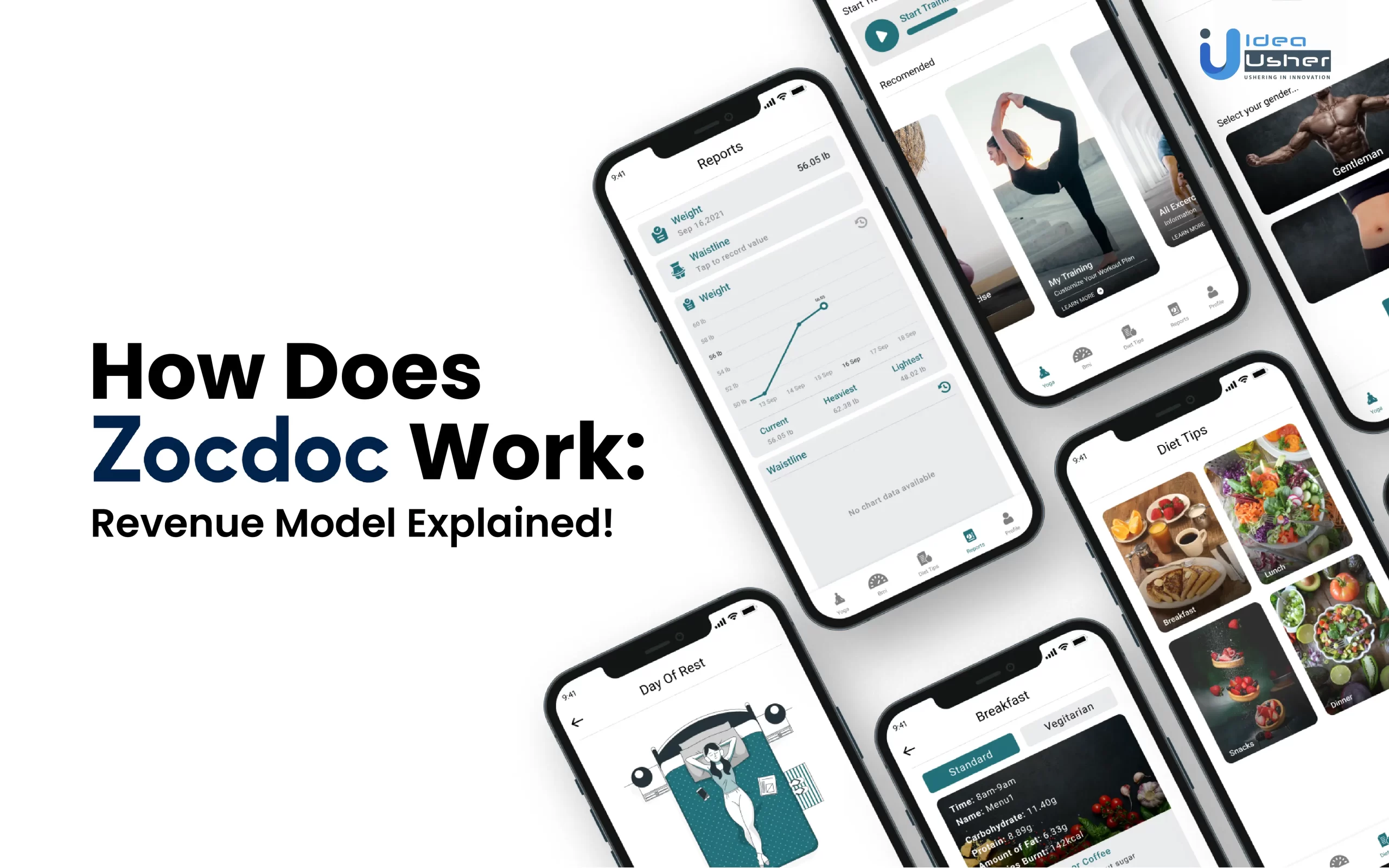
The healthcare appointment scheduling app domain is HUGE!
66% of US health systems provide online scheduling, and 64% of patients schedule appointments online. In 2020, healthcare providers spent $324.4 million on appointment scheduling, and it is predicted that by 2027, they will spend as much as $690 million to increase the patient scheduling market size further.
With millions of patients and doctors using apps like ZocDoc and MyChart to manage their healthcare, the potential for growth and success is practically limitless.
This report critically analyzes the business prospects of healthcare appointment booking apps by reviewing the popular healthcare platform ZocDoc. We will also delve into the performance of Zocdoc over the years, conduct a comprehensive SWOT analysis, provide insights into their revenue model, and suggest other alternative apps and platforms help you make an informed decision before building your own healthcare app.
So, without further ado, let’s start.
What is ZocDoc?
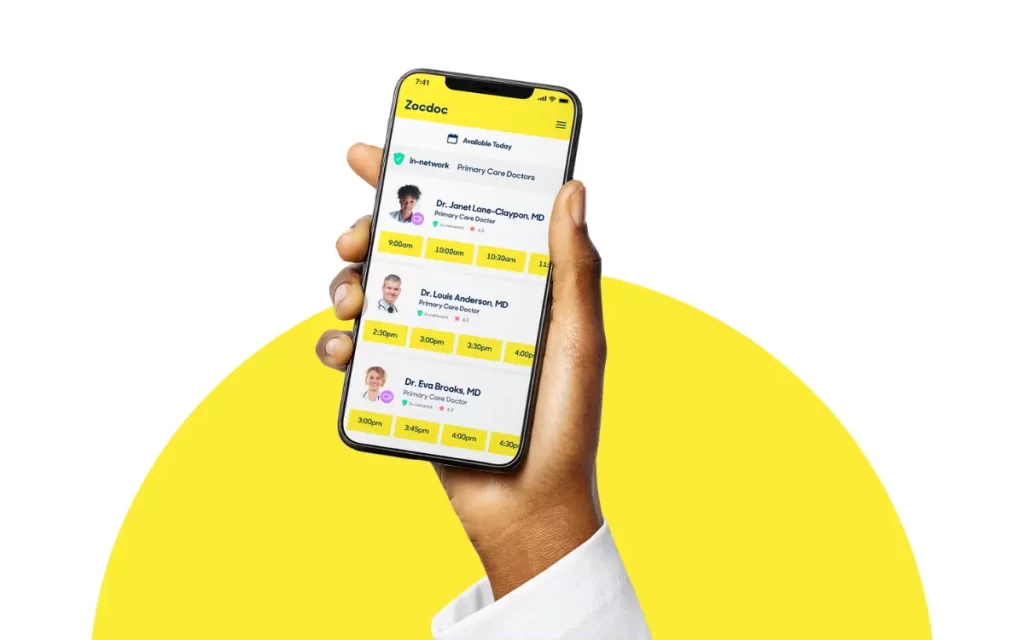
ZocDoc is an amazing platform that connects patients with trusted healthcare professionals. Founded in 2007, it was created by an emergency room physician who wanted to make it easy and convenient for people to find doctors and schedule appointments online. Today, ZocDoc has over 25 million patients and 50,000 doctors on its platform, and it’s available in over 40 states across the US.
What’s so cool about ZocDoc is that it allows you to easily find doctors who take your insurance, even if it’s not a common plan. You can also compare reviews and ratings of different healthcare providers to make an informed choice about which doctor to see.
And booking appointments is incredibly easy and convenient – you can do it from your desktop or mobile device, and you’ll receive a confirmation via email or SMS. Plus, the appointments you book on ZocDoc are guaranteed to be seen within two business days of your first requested time slot.
ZocDoc’s SWOT Analysis

Strengths
- Established brand with a strong reputation for healthcare scheduling and appointment management.
- User-friendly interface and easy-to-use mobile app.
- A strong network of healthcare providers and patients.
- A revenue-generating business model with multiple streams.
- High scalability potential with a microservices architecture and serverless infrastructure.
- Continuous innovation by incorporating new features like telemedicine and virtual consultations.
Weaknesses
- High competition in the healthcare industry with the presence of established players and new startups.
- Reliance on third-party services for payment processing and communication channels.
- Limited geographic presence, primarily focused on the United States market.
- Dependence on insurance companies and healthcare providers for revenue.
- Dependence on the healthcare industry and government regulations.
- Privacy and security concerns with patient data.
Opportunities
- Expansion of services and geographic presence to other regions and countries.
- Introduction of new revenue streams like advertising and analytics.
- Increasing demand for virtual consultations and telemedicine services due to the COVID-19 pandemic.
- Potential partnership opportunities with insurance companies and healthcare providers.
- Incorporating artificial intelligence and machine learning to improve the scheduling process and enhancing the patient experience.
Threats
- Changes in healthcare policies and regulations can impact revenue streams.
- Cybersecurity threats and data breaches can impact brand reputation.
- Competition from new entrants in the market with innovative solutions.
- Dependence on third-party services and their reliability and pricing.
ZocDoc’s Business: Critical Analysis
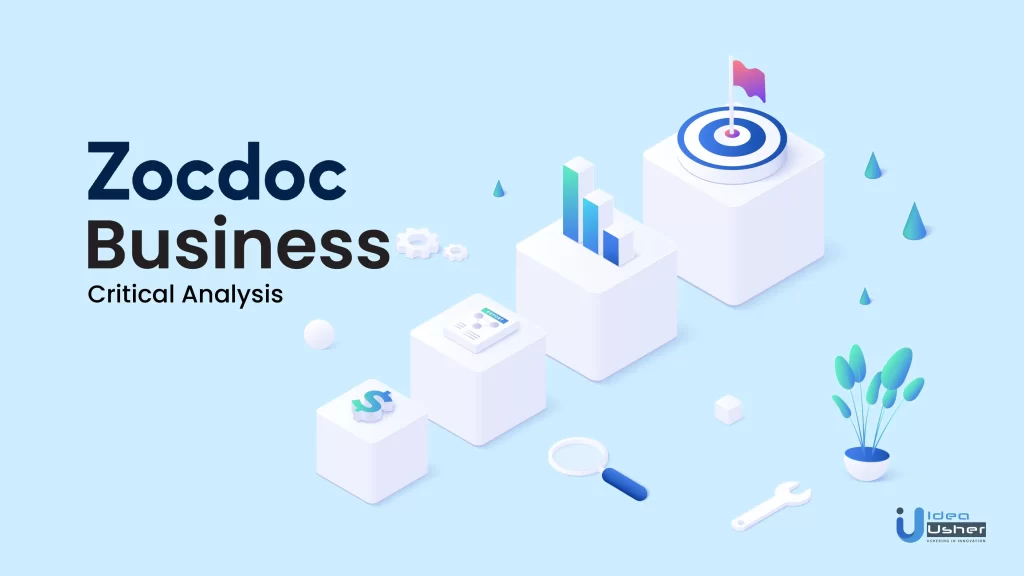
The pandemic has been the biggest driver in increasing people’s consideration for systematic healthcare. This gave rise to the market of healthcare appointment scheduling apps.
Still, as per analysis, 24% of the overall patient customer base surveyed by ZocDoc said they put off preventive care during the early stages of the pandemic and still need to catch up on scheduling those appointments.
ZocDoc facilitates both in-person and virtual contact between healthcare providers and patients. This is because 79% of patients prefer to use a combination of both virtual and in-person care in the future. 94% of patients want ongoing relationships with providers and to get high-quality care, whether in-person or virtually.
The few disturbances patients face during their live sessions were sudden family or roommate appearances in the background, television noises, pets appearing…and so on!
The platform has successfully raised an impressive amount of funding, with $375.9 million raised over 10 rounds. Their most recent funding was raised on February 11, 2021, through a Private Equity round. The company is backed by 19 investors, with Francisco Partners and Manhattan Venture Partners being the most recent ones. According to Crunchbase data, the company’s post-money valuation was estimated at around $10 billion.
Why do apps like ZocDoc Actually Sell?
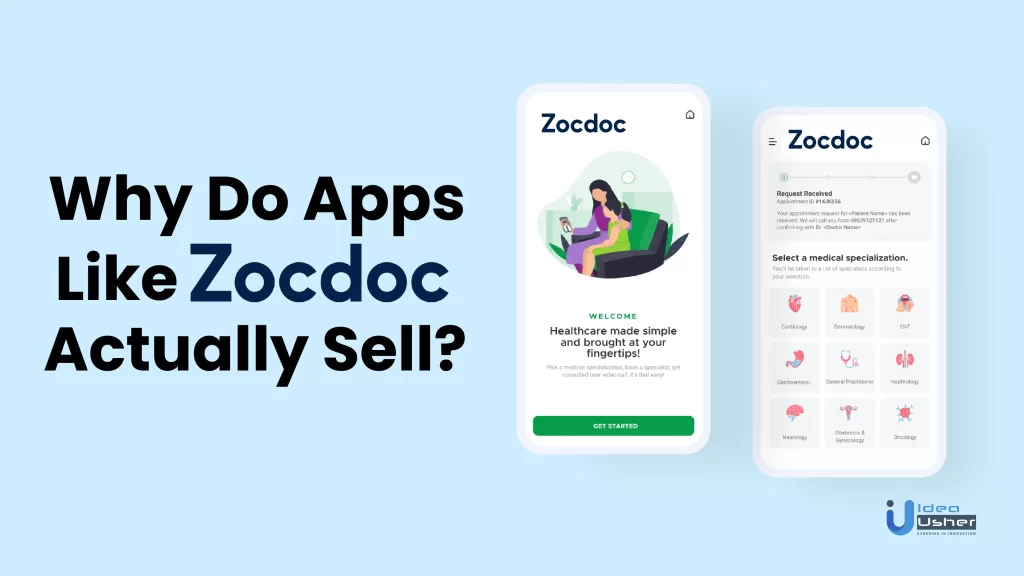
The rise of apps like ZocDoc in the US can be attributed to several pain points and problems within the healthcare system.
One significant challenge is the long wait times for physician appointments, which have increased over the years. According to the Merritt Hawkins 2017 Survey, the average wait time for a physician appointment is 24.1 days in metro cities, a 30% increase from 2014. This wait time is even higher in mid-sized metro cities, with an average booking time of 32 days. This extended wait time can increase emergency department utilization, lower patient satisfaction, and greater no-show rates.
Another issue within the healthcare system is the dominance of the Fee-for-Service payment model for healthcare providers. This model incentivizes providers to offer more services and perform more procedures rather than focusing on value-based care that promotes coordinated and effective care services. Apps like ZocDoc aim to shift the focus towards value-based care, prioritizing patient engagement, individualized care, and technology investments.
All these streamlined processes reduce wait times, increase patient engagement, and help fill last-minute openings in physicians’ calendars. These apps encourage providers to shift towards a value-based care model by incentivizing coordinated and effective care services.
How does ZocDoc make money?
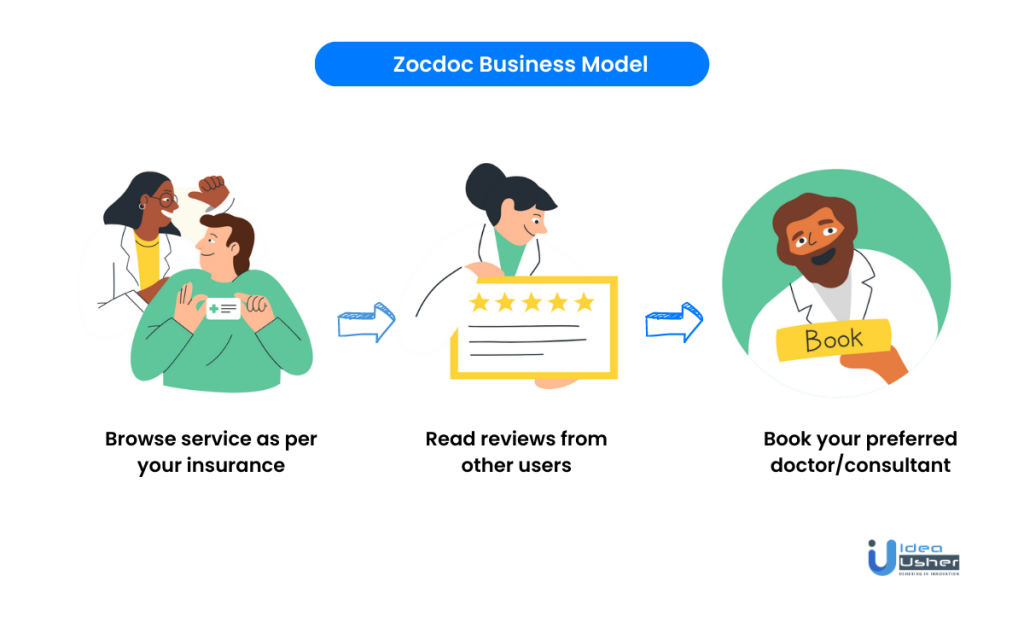
The way ZocDoc performs business is really easy.
- Healthcare providers pay subscription fees to get listed on ZocDoc’s platform.
- Patients search for providers and filter results.
- Patients view provider profiles and book appointments through ZocDoc’s platform.
- ZocDoc verifies patients’ insurance eligibility.
- Healthcare providers receive appointment requests and manage billing and payments through ZocDoc’s platform.
The company operates on a subscription-based revenue model that charges doctors and healthcare providers for the privilege of being listed on their platform. This fee is dependent on the size and location of the practice, as well as the number of healthcare providers listed on the platform. This fee helps them connect with patients who need their services, manage their practices more efficiently, and fill up canceled appointments at the last minute.
Apart from this, Zocdoc also makes money through its “Sponsored Results” service. This service helps doctors stand out and get noticed by patients looking to book appointments. When doctors opt for this service, their ads are shown only to eligible patients. The cost of the ad depends on various factors such as patient reviews and ratings on Zocdoc, the size of the practice, marketing, advertising budget, and the bid rate for specialty and market.
This revenue model has proven to be successful due to the high demand for healthcare services in the United States. ZocDoc’s large user base of over 25 million patients provides a significant pool of potential customers for healthcare providers.
Moreover, ZocDoc’s value proposition of providing a convenient and hassle-free way to find and book appointments online distinguishes it from competitors. The focus on insurance verification and streamlined appointment booking processes further enhances ZocDoc’s appeal to both patients and providers.
Zocdoc’s Technological Advancement
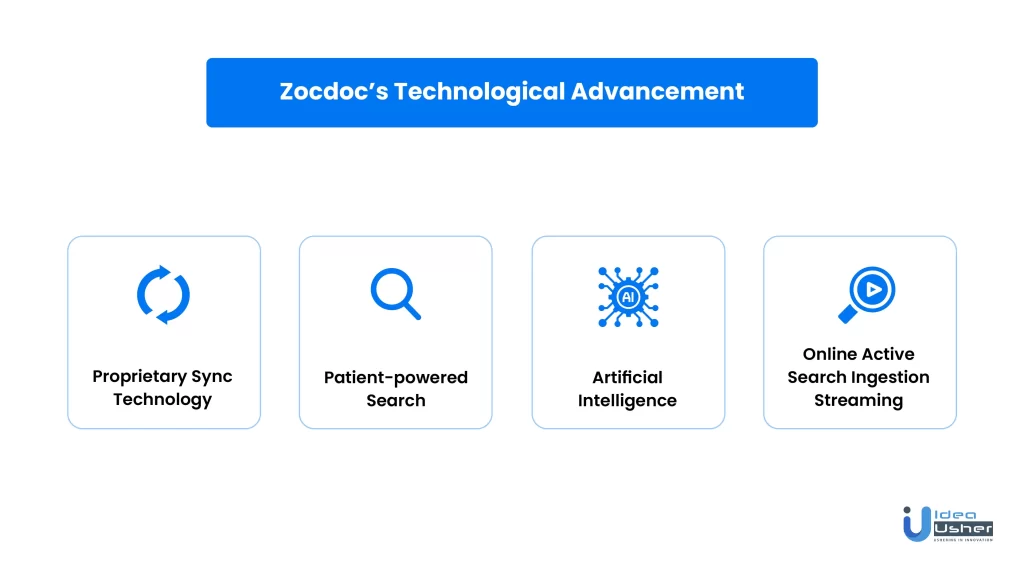
Zocdoc effectively leverages technology and data science to create a marketplace connecting patients with the right doctors and reducing wait times. This has been made possible by Zocdoc’s ability to work across different practice management software (PMS) systems, allowing the platform to partner with health systems and practices of various sizes across the United States and serve patients in all 50 states. Among the technologies that provide Zocdoc a competitive edge are proprietary sync technology, a patient-powered search engine, artificial intelligence (AI), and their OASIS ingestion system.
Proprietary Sync Technology
Zocdoc’s proprietary sync technology is an important part of its platform that enables patients to view real-time availability for healthcare providers. The technology works by connecting Zocdoc’s portal with the calendars of healthcare providers, which are often managed by different practice management systems (PMS). Through the sync technology, Zocdoc can gather information on available appointment slots from multiple PMS systems in real-time, making those slots available to patients through the Zocdoc platform. This allows patients to quickly and easily find open appointments with healthcare providers and make bookings without contacting the provider directly. This helps to streamline the healthcare booking process, making it faster and more convenient.
Patient-powered Search
The patient-powered search engine leverages machine learning to allow patients to use their own language, including colloquial terms, slang, and misspelled symptoms, to confidently find the right provider for their needs. This technology also lets patients view open appointments, especially those available within the next two calendar days.
Artificial Intelligence
Zocdoc’s medical appointment booking app uses AI to decipher, understand, and verify patients’ insurance, which can be a significant barrier to healthcare access for many people. The AI model can recognize the patterns of thousands of medical insurance cards and match them with known carrier and plan information.
Online Active Search Ingestion Streaming
Zocdoc uses OASIS, an event-driven ingestion system, to update doctors’ information immediately when it changes. The OASIS platform includes a set of AWS Lambda functions and SQS queues triggered by doctor-related data sources. This system allows for changes in doctor information to be reflected immediately without any impact on system performance. Overall, the OASIS platform has allowed Zocdoc to update doctor information in real time and prevent performance issues, leading to a better experience for both patients and healthcare providers.
Alternatives of ZocDoc
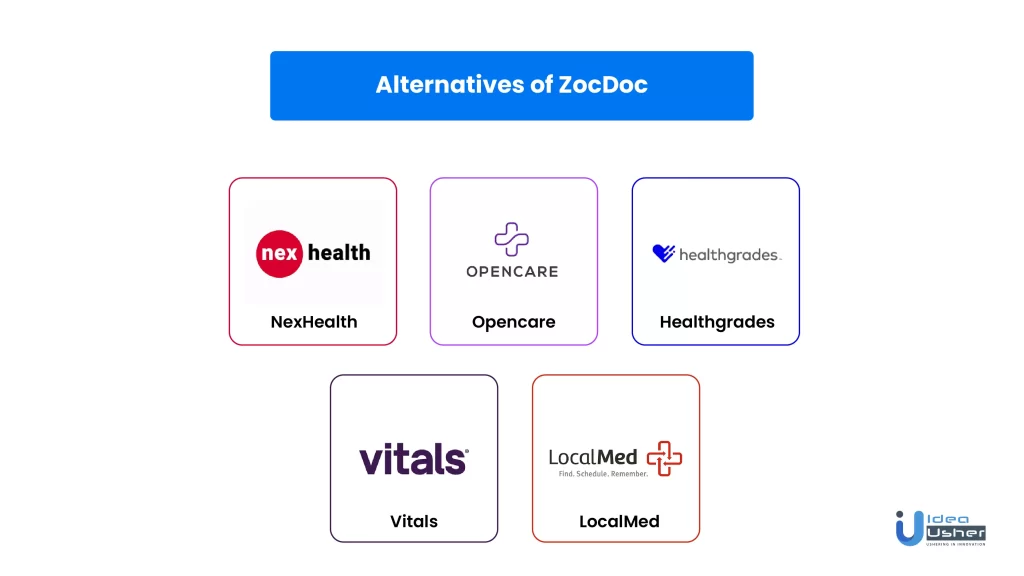
Although Zocdoc is the top-shot app in the healthcare appointment scheduling domain, there are many other alternative platforms that can benefit both patients and providers in the healthcare industry. The top 5 alternatives to ZocDoc are:
1. NexHealth
Specialization: Dental, Medical, Healthcare
Cost: Not disclosed
Best for: Online scheduling, automated reminders
Highlight: NexHealth allows patients to schedule appointments, submit paperwork, and communicate with staff online. It also helps providers manage their calendars and reduce no-show rates by sending outreach messages to fill canceled slots.
2. Opencare
Specialization: Dental
Cost: Free for patients, custom quotes for providers
Best for: Communicating with dental office staff, automatic review collection
Highlight: Opencare is a marketplace that matches patients with dental professionals based on their specific needs. Providers only pay after the patient shows up, and Opencare integrates with most practice management software.
3. Healthgrades
Specialization: Dental, Medical, Healthcare
Cost: Free for patients, claim free profile with option to upgrade for providers
Best for: Patients booking online or by phone, providers adding appointment scheduling button to user profile
Highlight: With over 10 million patient ratings, Healthgrades offers real-time insights into providers’ online reputations. Patients can search for providers by specialty, condition, or procedure, and providers can use the Healthgrades call center to avoid missing patient calls.
4. Vitals
Specialization: Dental, Medical, Healthcare
Cost: Free for patients; claim the free profile for providers
Best for: Patients searching for providers by city, name, specialty, or insurance plan; providers displaying awards and ratings
Highlight: Vitals is a database of patient reviews for healthcare professionals and facilities. Providers can list all the specialties they treat to increase their visibility, while patients can access detailed educational guides about diseases.
5. LocalMed
Specialization: Dental
Cost: Free for patients, custom quote for providers
Best for: Real-time scheduling, appointment reminders
Highlight: LocalMed is a scheduling platform that helps dental providers connect with patients who find them online. Patients can see providers’ calendars in real-time, and LocalMed integrates with providers’ practice management software.
Key Takeaways
Here, the takeaway is not simply to replicate ZocDoc’s revenue model and business strategy.
- Understanding the pain points of patients and providers in the U.S. healthcare system, or any location for that matter, is crucial for developing a successful healthcare technology platform like Zocdoc.
- Zocdoc targets reducing patient wait times while also providing benefits like better visibility and easy reimbursements for healthcare providers and physicians.
- Building a network of doctors and practitioners on the platform is difficult but possible with time. Zocdoc took 9 years to build a network that caters to 6 million users per month across 2000+ cities in the U.S.
- Utilizing appropriate and updated technology, like AI, is important for offering valuable and creative features for patients and providers.
- Having a scalable team in-house or choosing a healthcare technology partner is crucial for building and maintaining a successful tech-driven platform.
Conclusion
Building a healthcare appointment scheduling app like ZocDoc can be incredibly profitable. Such platforms offer several revenue streams, including subscription fees, booking fees, and additional services such as medicine delivery. With proper monetization strategies, building an app like ZocDoc can result in a substantial return on investment.
At Idea Usher, our team will guide you through every step of the process, from market research to monetization strategies. We also offer post-launch maintenance and support to ensure your app continues to function smoothly.
Get in touch with us now!
Contact Idea Usher at [email protected]
Or reach out at: (+1)732 962 4560, (+91)859 140 7140
FAQs
Q . What is the revenue of ZocDoc company?
A. ZocDoc’s peak revenue in 2021 was $71.0 million.
Q . Is ZocDoc profitable?
A. ZocDoc is a unique private technology company that combines EBITDA profitability with a rapidly increasing growth rate. The company has raised over $230 million in funding and has a valuation of over $1.8 billion.
Q. How to build my own healthcare consultation platform?
A. To build your own healthcare consultation platform, you must start with a comprehensive plan, including a detailed list of features and specifications. From there, you need to choose a technology stack, hire a development team, and begin the development process. It is crucial to ensure that your platform complies with all relevant healthcare regulations and data privacy laws.
Q. Can Idea Usher help me build a healthcare appointment scheduling app?
A. Yes, Idea Usher is a software development company with expertise in building healthcare applications, including appointment scheduling apps. We have a team of experienced developers who can work with you to develop a customized solution to meet your specific needs.








Sayan Chakraborty